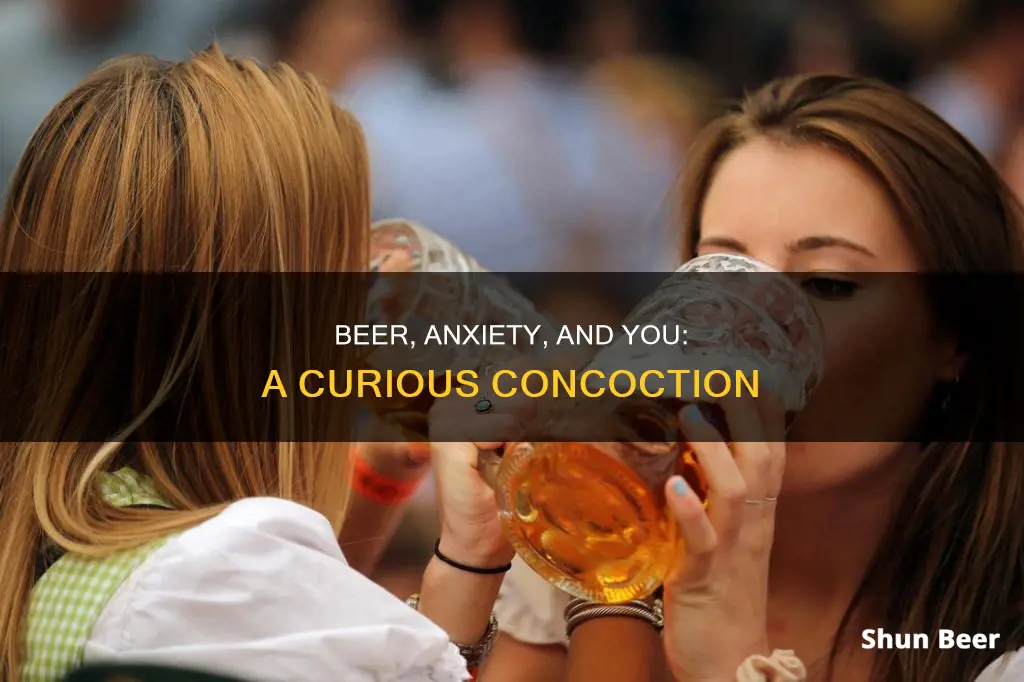
Alcohol is a depressant that affects the central nervous system. Drinking can reduce fears and take your mind off your troubles. It can help you feel less shy, boost your mood, and make you feel generally relaxed. However, drinking alcohol, especially heavily and over a long period, can increase your anxiety. Alcohol can affect your anxiety levels in several ways. Firstly, it can make it harder for you to get a good night's sleep. Secondly, it can affect your blood alcohol content (BAC), leading to temporary feelings of excitement, followed by feelings of depression as BAC levels fall. Thirdly, alcohol changes levels of serotonin and other neurotransmitters in the brain, which can worsen anxiety. Finally, drinking can cause hangovers, which can make it challenging to function and fuel anxiety.
What You'll Learn

Beer's temporary relief and long-term anxiety
Beers' Temporary Relief and Long-Term Anxiety
Beer, like any other alcoholic drink, is a depressant that affects the central nervous system. It can be a double-edged sword when it comes to anxiety. While it may provide temporary relief from anxious thoughts and feelings, it can also contribute to long-term anxiety and worsen existing symptoms.
The Temporary Relief
Beer can provide a sense of calm and relaxation, helping to take your mind off your troubles. This is because alcohol affects certain neurotransmitters in the brain, such as dopamine, gamma-aminobutyric acid (GABA), and serotonin. These neurotransmitters play a role in regulating mood, thoughts, and behaviour. As a result, drinking beer can lead to a boost in mood, decreased inhibition, and a sense of relaxation.
The Long-Term Anxiety
However, the relief that beer provides is only temporary. Once the effects of alcohol wear off, you may find that your anxiety returns, and in some cases, it can be even worse than before. This is because alcohol changes the levels of serotonin and other neurotransmitters in the brain, which can have a negative impact on mood and anxiety. Additionally, drinking beer can disrupt sleep patterns, further contributing to increased anxiety.
Furthermore, regular and heavy drinking can lead to the development of alcohol tolerance, where more alcohol is needed to achieve the desired effect. This can lead to a dangerous cycle where individuals rely on alcohol to cope with their anxiety, putting them at risk of alcohol dependence.
The Vicious Circle
The temporary feeling of relaxation from drinking beer can be misleading, often trapping individuals in a vicious circle. Here's how the cycle works:
- You initially feel calm as the alcohol affects your brain.
- As the effects of alcohol wear off, you start to feel anxious again.
- You may want to drink more beer to try to relieve your anxiety once again.
- However, as the initial calm feeling fades, your anxiety returns as the alcohol leaves your system.
The Bottom Line
While beer can provide temporary relief from anxiety, it is not a sustainable solution. The long-term effects of alcohol can worsen anxiety and lead to alcohol dependence. If you struggle with anxiety and find yourself relying on beer or other substances to cope, it is important to seek professional help.
Sprite vs Beer: A Healthy Alternative?
You may want to see also

Alcohol's effect on brain chemistry
Alcohol is a depressant that affects the central nervous system. Initially, drinking can reduce fears and take your mind off your troubles. It can help you feel less shy, boost your mood, and make you feel generally relaxed. However, alcohol's effects on brain chemistry are more complex.
Alcohol interferes with the brain's communication pathways and can affect the way the brain looks and works. It makes it harder for the brain areas controlling balance, memory, speech, and judgment to function properly, which can result in injuries and other negative outcomes.
On a neurological level, alcohol interacts with multiple neurotransmitter systems, disrupting the balance between inhibitory and excitatory neurotransmitters. Short-term alcohol exposure increases the inhibitory influences, leading to a sedative effect. However, with long-term alcohol exposure, the brain attempts to compensate by restoring equilibrium. These neurological changes lead to the development of tolerance, and when alcohol consumption is reduced or discontinued, the excitation of neurotransmitter systems can result in alcohol withdrawal syndrome.
Additionally, alcohol alters levels of serotonin and other neurotransmitters in the brain, which can worsen anxiety. The sense of relaxation provided by alcohol is often associated with an increase in blood alcohol content (BAC) levels, which leads to temporary excitement followed by feelings of depression as BAC levels fall. This can result in increased anxiety after drinking.
The complex interaction of multiple neurotransmitter systems, including dopamine, endogenous opiates, GABA, serotonin, and glutamate, plays a role in the reinforcing effects of alcohol and the development of alcohol-seeking behaviors. Alcohol can activate dopamine systems in certain brain areas and influence glutamate receptors, contributing to the rewarding and euphoric effects of alcohol consumption.
In summary, alcohol's effect on brain chemistry involves disrupting the balance of inhibitory and excitatory neurotransmitters, altering serotonin levels, and interacting with multiple neurotransmitter systems. These effects can provide temporary relief from anxiety but can also lead to tolerance, dependence, and increased anxiety in the long term.
Krups Beertender: Compatible With Other Beers?
You may want to see also

Alcohol and social anxiety disorder
Alcohol is a depressant that affects the central nervous system. It can reduce fears and inhibitions, and boost mood, which is why it is often used to unwind after a stressful day. However, drinking alcohol, especially heavily and over a long period, can increase anxiety. As the effects of alcohol wear off, a person may feel more anxious than they did before drinking. This is because alcohol changes levels of serotonin and other neurotransmitters in the brain, which can worsen anxiety.
Research has shown that alcohol use disorders frequently co-occur with anxiety disorders, with about 20% of social anxiety disorder patients also suffering from alcohol abuse or dependence. The tension reduction theory suggests that people with social anxiety use alcohol to alleviate their fears. However, this can lead to a dangerous dependence on alcohol during socialising, which can, in turn, worsen anxiety symptoms.
While alcohol may seem to provide short-term relief, it can quickly become a "crutch". If a person relies on alcohol to feel more relaxed in social situations, they may eventually feel the need to avoid any socialising where drinking is not possible, which can make their anxiety worse.
Underground Beer Coolers: Do They Keep Drinks Chilled?
You may want to see also

Alcohol-induced sleep disruption
Alcohol is a sedative and a depressant that affects the central nervous system. It can reduce stress and anxiety and make one feel relaxed. However, alcohol can also disrupt sleep patterns and cause sleep fragmentation, especially in the second half of the night.
Alcohol consumed before bedtime will still be in the bloodstream when one falls asleep, altering sleep architecture and causing more deep sleep and less REM sleep in the first half of the night. REM sleep, which is when most dreaming occurs, is suppressed. Later in the night, as alcohol levels in the bloodstream drop, the body undergoes a rebound arousal, causing fragmented sleep and frequent awakenings. This is further exacerbated by alcohol's diuretic effect, which increases urine output and the urge to urinate.
The negative impact of alcohol on sleep can lead to a vicious cycle. The poor quality of sleep caused by alcohol consumption can lead to daytime sleepiness, which may be self-medicated with caffeine, further disrupting sleep at night. This can result in a pattern of insomnia, with alcohol being used as a hypnotic agent to induce sleep.
In addition to acute effects, chronic alcohol use can also lead to long-term sleep disturbances. Studies have shown that alcohol abuse and dependence are associated with chronic sleep problems, including insomnia and sleep apnea. These sleep issues can persist even after prolonged periods of abstinence and may contribute to relapse.
BeerSmith Compatibility: Apple Devices and Beyond
You may want to see also

Alcohol withdrawal
The symptoms of alcohol withdrawal typically begin within 6 to 24 hours of stopping or reducing alcohol consumption, and they can include anxiety, nervousness, irritability, increased blood pressure, increased heart rate, high body temperature, tremors, and insomnia. In more severe cases, hallucinations and seizures may occur within the first 48 hours, and delirium tremens may develop between 48 to 72 hours after the last drink.
The severity and duration of alcohol withdrawal symptoms depend on various factors, including the amount and duration of alcohol consumption, age, and coexisting health conditions. However, it is difficult to predict who will experience alcohol withdrawal and how severe it will be.
The treatment for alcohol withdrawal aims to reduce withdrawal symptoms, prevent complications, and provide treatment options for alcohol use disorder. Mild to moderate alcohol withdrawal can be managed with medications such as carbamazepine or gabapentin, while severe cases may require hospitalisation and treatment with long-acting benzodiazepines.
It is important to seek medical help for alcohol withdrawal, even for mild symptoms, as it can quickly become life-threatening. Total and lifelong abstinence from alcohol is the best treatment for those who have experienced alcohol withdrawal.
Tums to the Rescue: Beer Sickness Solution?
You may want to see also
Frequently asked questions
Drinking beer or alcohol when feeling anxious is not recommended. While it may provide temporary relief, alcohol is a depressant that can increase anxiety as it leaves your system. It can also lead to a dependence on alcohol to cope with anxiety.
Beer or alcohol can initially reduce anxiety by acting as a sedative and affecting the central nervous system. However, as the effects wear off, you may experience increased anxiety or a rebound effect, making you feel even more anxious than before.
Some people self-medicate with alcohol to reduce stress and anxiety. Alcohol can provide a sense of relaxation and make social situations more bearable. However, this can lead to unhealthy coping mechanisms and a higher risk of developing an alcohol use disorder.
Drinking beer or alcohol when anxious can have serious consequences, especially if you are being treated for anxiety or taking certain medications. It can disrupt your sleep, affect your brain chemistry, and lead to physical and mental health issues such as liver damage, brain damage, and increased anxiety over time.
Yes, there are healthier ways to cope with anxiety. It is recommended to seek help from a mental health professional and explore other treatment options such as therapy, medication, meditation, exercise, and lifestyle changes.







